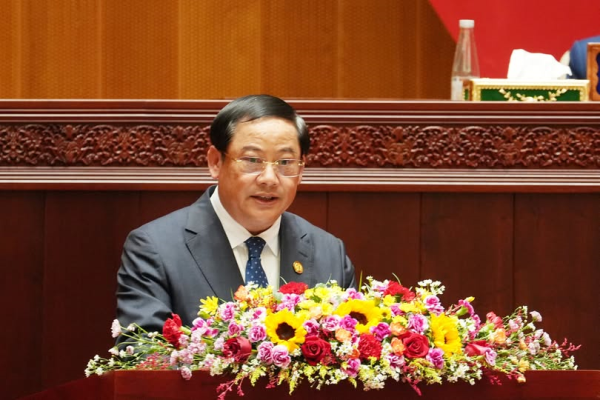KPL
On November13, 2025 Prime Minister Sonexay Siphandone has pledged accelerated action to address critical development challenges facing the country, including repairing damaged infrastructure, mitigating the impact of natural disasters, and boosting dry-season agricultural output.

(KPL) On November13, 2025 Prime Minister Sonexay Siphandone has pledged accelerated action to address critical development challenges facing the country, including repairing damaged infrastructure, mitigating the impact of natural disasters, and boosting dry-season agricultural output.
Speaking during the 10th Ordinary Session of the 9th Legislature of the National Assembly, Mr. Siphandone reaffirmed the government’s commitment to achieving its 2025 economic and social development goals. He outlined specific measures aligned with Resolution No. 169/NA, passed in June 2025, to guide the national strategy in the final six months of the year.
Stabilizing the Economy
The Prime Minister stressed that macroeconomic stabilization is the government’s top priority. This includes maintaining the stability of the Lao kip, keeping inflation under control, managing goods prices, improving public communication, and continuing public debt resolution. A key focus will be on the introduction and enforcement of tighter monetary and exchange rate policies.
He also highlighted continued efforts to modernize the financial system through digital infrastructure, aimed at expanding access to credit and enhancing tax collection systems.
Strategic Expenditure and Infrastructure
To manage the budget deficit responsibly, Mr. Siphandone said the government would curb non-essential spending and prioritize investments in critical infrastructure. Repairs to damaged national roads, especially those connecting provinces and neighbouring countries, will be accelerated.
In line with Resolution 165/NA, the government will delegate authority to provincial authorities to expedite road repairs and maintenance, with priority given to 15 major routes and 28 critical sections. This policy is supported by Resolution No. 10/Govt and Ministry of Public Works Notification No. 24370/MPWT, issued on 10 October 2025.
Human Development and Social Sectors
Investment in education and healthcare remains a key component of the government’s strategy. Mr. Siphandone revealed ongoing work to adjust salary structures and allowances for civil servants, military personnel, police, teachers, and pensioners, with implementation expected in January 2026 pending parliamentary approval.
Human resource development will also be tied to the needs of a modernizing economy, including improved access to digital skills training and vocational education.
Boosting Domestic Production and Private Investment
The government aims to enhance domestic production, reduce unnecessary imports, and stimulate exports. This will be supported by policies creating a more attractive environment for private investment, accompanied by stronger regulatory oversight of existing projects.
New laws concerning state land leases and commercial use are set to facilitate smoother private sector operations.
Regional Connectivity and Tourism
Using the Lao-China Railway as a catalyst, Laos plans to position itself as a regional logistics hub by improving cross-border services and transport systems. The government will also deepen engagement with ASEAN, RCEP, GMS, and other partnerships.
Meanwhile, the tourism sector will receive renewed focus through infrastructure upgrades and targeted promotion campaigns, supported by diversified funding sources.
KPL